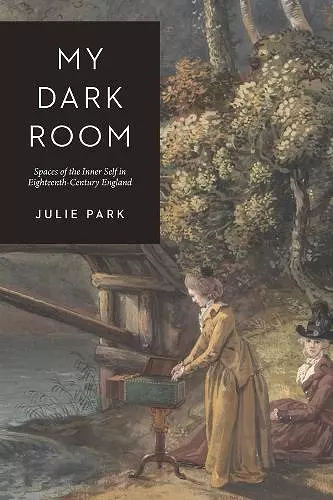My Dark Room
Spaces of the Inner Self in Eighteenth-Century England
Format:Paperback
Publisher:The University of Chicago Press
Published:23rd Nov '23
Should be back in stock very soon

Examines spaces of inner life in eighteenth-century England to shed new light on interiority in literature and visual and material culture.
In what kinds of spaces do we become most aware of the thoughts in our own heads? In My Dark Room, Julie Park explores places of solitude and enclosure that gave eighteenth-century subjects closer access to their inner worlds: grottos, writing closets, landscape follies, and the camera obscura, that beguiling “dark room” inside which the outside world in all its motion and color is projected. The camera obscura and its dreamlike projections within it served as a paradigm for the everyday spaces, whether in built environments or in imaginative writing, that generated the fleeting states of interiority eighteenth-century subjects were compelled to experience and inhabit.
My Dark Room illuminates the spatial and physical dimensions of inner life in the long eighteenth century by synthesizing material analyses of diverse media, from optical devices and landscape architecture to women’s intimate dress, with close readings of literary texts not traditionally considered together, among them Andrew Marvell’s country house poem Upon Appleton House, Margaret Cavendish’s experimental epistolary work Sociable Letters, Alexander Pope’s heroic verse epistle Eloisa to Abelard, and Samuel Richardson’s novel Pamela. Park also analyzes letters and diaries, architectural plans, prints, drawings, paintings, and more, drawing our attention to the lively interactions between spaces and psyches in private environments. Park’s innovative method of “spatial formalism” reveals how physical settings enable psychic interiors to achieve vitality in lives both real and imagined.
“A beautiful book on the privacies of writing, the rapt silences of the mind’s darkened room, lit by rays of the everyday: the habitations of thought that those before Proust conceived. My Dark Room answers to my sensibility; it teaches me who I am and where I come from, providing new coordinates and new darknesses between the points of light.” * Alexander Nemerov, author of 'The Forest: A Fable of America in the 1830s' *
“My Dark Room explores the ways in which the camera obscura, both materially and conceptually, provided the corridor through which the interior lives of eighteenth-century subjects passed. In a dazzling sequence of chapters Julie Park captures the excitements and tensions that emerged as imaginative private worlds were projected on real geographies and spaces. My Dark Room will unsettle the now very long-standing assumptions about the primacy of fiction and the novel in the construction of eighteenth-century subjectivities, as it makes a compelling case for the subject in space created through interior projections.” * Peter de Bolla, University of Cambridge *
“Park animates the camera obscura trope as a perceptual dynamic for which, until now, we've had so few words. She interweaves a material history of the camera obscura with several disciplines until it becomes possible to reenvision eighteenth-century literary fiction as a transhistorical and intermedial home for the psyche. My Dark Room opens interiors we once assumed were shut, unsettling familiar narratives about the post-Enlightenment mind. This lucidly dreamed study is a feat of the critical imagination to be experienced as well as read. It will be admired and referenced for years to come.” * Jayne Lewis, University of California, Irvine *
"My Dark Room is a wonderful mix of discovery and analysis. With an impressive range of historical and philosophical contexts and delightful close readings of architectural and literary works, Park reveals the camera obscura modelling the spatial relationship between mind, landscape, and narrative." * Cynthia Wall, University of Virginia *
"Park is a tireless scholar; she clearly loves what she's discovering spirited away in the archives, and her sense of wonder and delight can be contagious." * Book Post *
“In a book that takes illumination and insight as its subject, [Park’s] meticulous close readings and case studies open up rich possibilities for future work.” * Times Literary Supplement *
"The controlling metaphor of Park's stunningly original argument is the camera obscura, the dark room within which one stands and views external reality as it is transfigured by the space in which it is projected and by the imagination of the individual who perceives it in this space. . . . Park references paintings, letters, furniture, gardens, and other aspects of 18th-century material life to bolster her claim that the dark rooms of the period were the spaces in which the individual's imagination claimed authority over self and experience. Lavishly illustrated, eminently readable, brilliantly argued, utterly convincing. . . . Essential." * Choice *
ISBN: 9780226824765
Dimensions: 229mm x 152mm x 25mm
Weight: 513g
352 pages